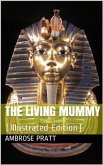An audacious murder on a privately hired train kick-starts a diplomatic crisis involving Britain, Japan and the good ol'US of A.
Another murder, equally baffling to Scotland Yard, soon follows and suspicion begins to fall on Prince Maiyo, an accomplished Japanese nobleman who has been touring Europe gathering information for the emperor. Penelope Morse, an American lady with diplomatic connections, becomes both wary and fascinated by him:
Oppenheim was something of a dab hand at early 20th century espionage. What started out as a murder mystery soon opened out into an examination of pre-WWI power politics, then in the final third became a cultural comparison between Japan and the UK, by no means a favourable one to the latter.
Another murder, equally baffling to Scotland Yard, soon follows and suspicion begins to fall on Prince Maiyo, an accomplished Japanese nobleman who has been touring Europe gathering information for the emperor. Penelope Morse, an American lady with diplomatic connections, becomes both wary and fascinated by him:
Oppenheim was something of a dab hand at early 20th century espionage. What started out as a murder mystery soon opened out into an examination of pre-WWI power politics, then in the final third became a cultural comparison between Japan and the UK, by no means a favourable one to the latter.









